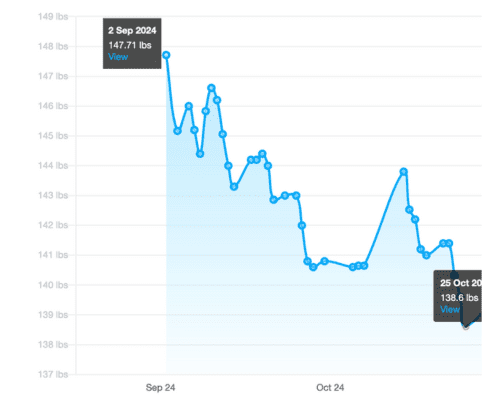3 Ways To Re-Write Your Goals So They Stick This Time
Dec 30, 2020 by Michael Fouts
Read time: 3 min.
We’ve all been there. You get really excited about making a fitness-related goal and decide to dive in headfirst, like paying for a year-long gym membership. Looking back at the end of the year you realize you fell off the wagon, so to speak, at month 2 and only used the gym 20 times over the course of the year.
Part of why many people don’t follow through and stick with their goal has to do with how the initial goal is set up. Below are 3 ways to re-write your goals to help you make goals that stick this time.
- For a more in-depth article on how to create a health goal read this.
1. Use approach-oriented goals, not avoidance-oriented goals
An approach-oriented goal is where you focus on doing things a little bit better, and approaching a better outcome. In contrast an avoidance-oriented goal is where you try to not do something.
John Berardi highlights some good examples, from his book Change Maker:
- Instead of “no junk food,” try focusing attention on eating more cut-up fruits and vegetables.
- Instead of “no soda,” try focusing attention on drinking a glass of water with at least three meals each day.
- Instead of “no stress-eating,” try focusing attention on stress-relieving activities to do instead of eating.
It’s been shown that those who focus on approach-oriented goals tend to be much more successful in reaching their goal; read a study done on this.
2. Turn outcome goals into behavior goals
An outcome goal is something like: “I want to lose 10 lbs, run a 28 minute 5 km, squat my weight…etc.” These are all great, but it’s much more effective to focus on a behaviour goal that reinforces the outcome goal.
- Example for weight loss: “I will exercise 4 times per week for 30 minutes, and 6 out of 7 days of the week I will eat 1/2 plate of vegetables with at least one meal.”
This is something we do with our clients and is much more successful.
3. Focus on mastery and not performance goals
Excerpt from John Berardi’s book Change Maker: “Performance goals are a lot like outcome goals, except they’re usually associated with external validation – wanting to win a competition for the prize money or wanting to beat a record time…In contrast mastery goals are about learning, skill development, and the intrinsic value of becoming excellent at something.”
Performance goals can have limitations since there are many factors that can affect the outcome, and this can be demotivating if you don’t achieve your performance goal. Further, after a while, it can be increasingly hard to continue to push for performance goals. Instead, if you focus on mastering the process – like skill development – you’ll enjoy the process much more and almost always improve your performance goal.
An example, that John uses in his book, is setting a new half-marathon personal record. How to approach this goal ties in points 2 and 3, as this is both an outcome and a performance goal. Instead of focusing on a set time, something we’d do with our clients is the following:
- Running 4x a week. Use a reverse-engineered plan, up to race day, that will include increasing volume week-to-week with: 1 interval tempo run (hill repeats, fartlek), 1 pace medium length run, 1 above pace short run, and one below pace long run.
- Focus on running technique mastery: proper foot striking, faster food speed and not larger strides, proper breathing technique, etc.
With mastery goals, the focus becomes about progression and not performance.
These are 3 ways to think about making a fitness-related goal – or any goal for that matter. If you have a fitness goal that we can help out with us, send us a message we’d be happy to help.
Interested In Being A Client?
Click Here and fill out a quick interest form and we’ll be in touch!
Or…Stay In Touch
Join everyone else that we email, no more than once per month, to keep in touch about recent blog posts, new workout programs, meal plans and recipes to try, and more…






